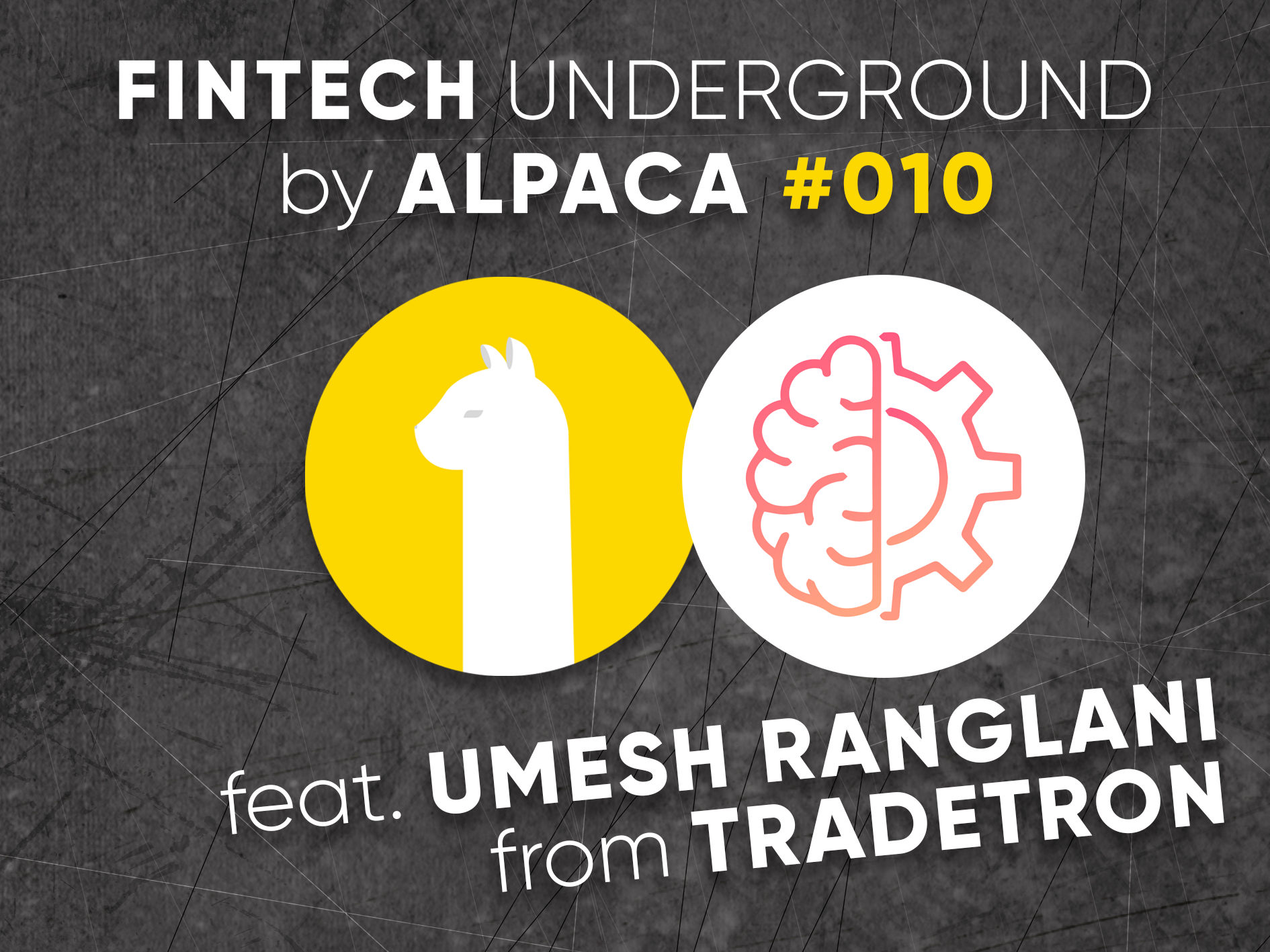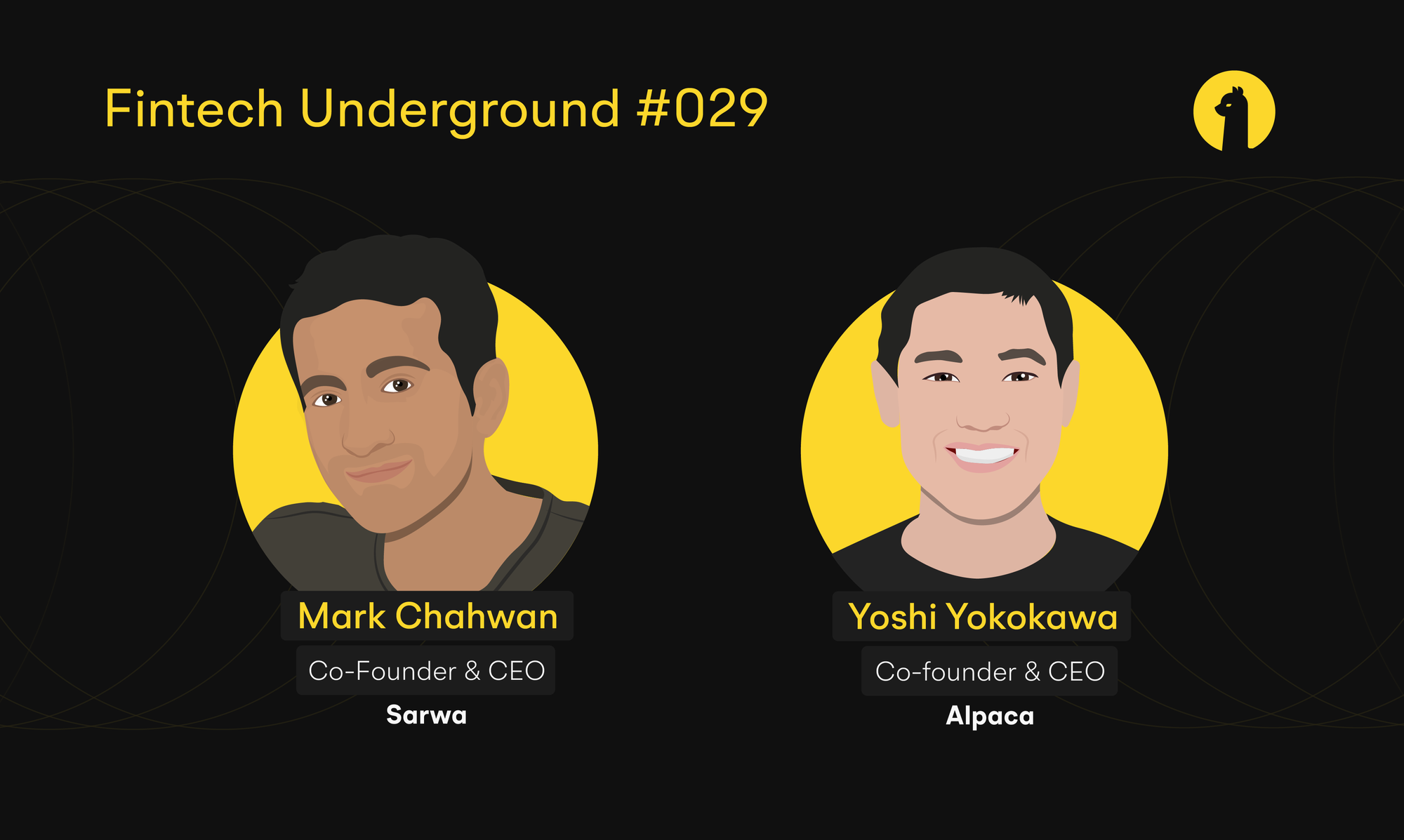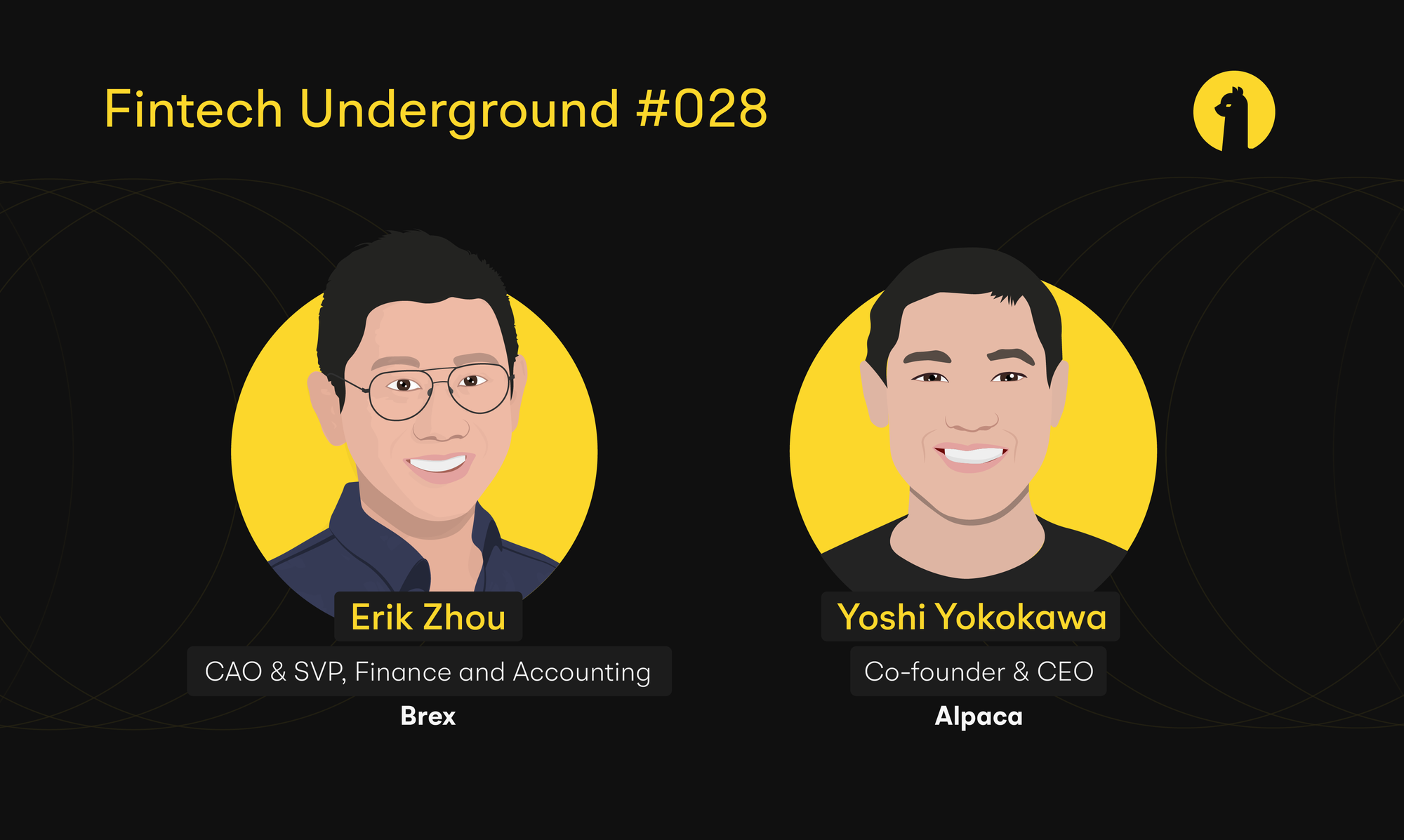
Any opinions expressed are opinions of the host and their guests. Alpaca Securities LLC does not recommend any specific investments or investment strategies.
Fintech Underground by Alpaca is a podcast devoted to all topics related to stock trading and APIs. From trading with algorithms or connecting apps or building out services, we aim to bring light to the different corners of Fintech.

TL;DR
On our tenth episode of Fintech Underground by Alpaca we interviewed Umesh Ranglani. As the CEO of Tradetron, an algorithmic trading strategy marketplace, Umesh begins by sharing his background and motivation to create a no-code strategy builder. From there we discuss different features of Tradetron, which includes their web-builder, marketplace, and mobile app. Ending the episode with their roadmap, this conversation is not one to be missed.

Summary
Allowing people to create and share algorithmic trading bots at the click of a button, Tradetron offers an algorithmic strategy builder and marketplace. Today we were lucky enough to speak to Umesh Ranglani, the CEO of Tradetron. With a platform that supports multiple assets, currencies, and exchanges Umesh explains how users can list and subscribe to different trading strategies. Not only that, but Umesh shares the most popular trading strategies on the platform to date along with a quick overview of their users. The episode closes with Umesh discussing Tradetron’s mobile app along with the roadmap moving forward which includes the addition of cryptocurrencies as a supported asset.
Find the full transcript below. To hear more CEO/Founders of the most interesting Fintech companies speak about their experience in the industry check out our other episodes below

Full Transcript
Jason: [00:00:00] Welcome to Fintech Underground by Alpaca, a podcast devoted to stock trading API. From trading with algorithms to connecting apps to building out services Alpaca is built for developers and traders. And with that being said, let's get started. Hello, everybody, welcome back to Fintech Underground by Alpaca. In each episode, we aim to explore a different area within FinTech.
I'm really excited for today's episode, where we have Umesh the CEO of Tradetron an algorithmic trading strategy marketplace. Allowing people to create and share algorithmic trading bots using only a web-based builder users can form complex strategies at the click of a button. In addition, as the platform supports multiple assets, currencies, and exchanges users can list trading strategies on the marketplace where others can subscribe and connect to their brokerage account.
As usual with Yoshi, CEO and co-founder of Alpaca, here to host today's episode is bound to be interesting. So let's get started.
Yoshi: [00:00:56] Hi, Umesh how are you today?
Umesh: [00:00:58] Very well Yoshi, How are you?
Yoshi: [00:00:59] Good? Good. I wanted to really say thank you for taking your time to appear on our podcast today, Fintech Underground. I know we have a lot to talk about with your product, but like, you know, firstly, do you want to introduce yourself and about the product that you're built?
Umesh: [00:01:12] Sure. Thank you for having me. It's really a pleasure to talk with you. Of course, we've been in touch when we were integrating Tradetron, which is a SaaS product, which I started around two years back with Alpaca. So we have been in touch since then. I'll give you a brief introduction to Tradetron once again.
So basically Tradetron is an algo strategy marketplace currently running in the U.S. and Indian markets. So along with listing all the algo strategies, the core strength of Tradetron is its strategy builder, which is completely codeless. So we have, let's say a list of 200 keywords, which can be combined to make conditions all with like drag and drop interface on a web interface.
And you link those conditions with different types of positions and any type of complex positions. So multi-layered options positions, and you can repair multiple times and you can have all kinds of executions, details filled in. All with just a drag and drop interface you can create a strategy.
Then we are linked with almost 40 odd brokers in India and three brokers in the U.S.to which the users can deploy the strategy and start taking trades. So it's completely codeless and it's completely web-based on the cloud. So yeah, that is a nutshell of Tradetron.
Yoshi: [00:02:37] Great. Like I think you’ve integrated with a lot of brokers already. It seems that you're growing. So what is your motivation originally to build and really the component of the marketplace of the strategies. And two is specifically building this with a no-code /low-code basis instead of utilizing the actual scripting and program, right?
Umesh: [00:03:01] So I've been in the software field for the last two decades. And I've been in the finance field for the last six or eight years. My software business was kind of plateauing and I ventured into the finance space and I learned about options. And my first venture was a web application called Option Tracker, which basically just kept the portfolio of options and gave you Greeks and gave you, what the Delta and all of that of the strategy is.
So that was like my baby step in the world of joining finance with the software world and into the Fintech world. I realized that as I'm trading, as my capital was growing, my emotional sways were growing as well. And I wasn't being able to turn a good profit even after knowing options really well.
So I was like, this is not about knowledge, this is a lot more. I have to get into automated trading if I have to succeed in this space. I learned algorithmic trading. And then I realized that even though I have a decent understanding of the software world, because I've been in it for the last two decades, it's not really easy.
They're data streams, there are APIs to connect brokers with. For each strategy which is like your mind is constantly in a state of flux and you're constantly wanting to evolve the strategy, each time you want to fix something, You have to go back to the programmer and it's a really complex process.
So like there has to be a better way. Any broker, any of these other tools, which are expecting people to learn the language. You know, if you're not a programmer, you're not a programmer. You're not going to be able to get the basic grasp of how it works and you won't be able to start your algo journey.
So my own problem was basically my starting point. Let me solve this problem for myself. And as I was doing that, I realized that clearly there is a market for this. So then I realized what other components? There an urban legend in the market, 90% of the people lose money.
And so on. I would say, what are the components like clearly there's somebody out there making money, right? What are the components? Let's break them down into the principles of it. So there is a great strategy of course. There is luck, which you can't do anything about. There is a great technology.
If we can work on the technology part and the strategy part and these two are made available to people, they should ideally be able to make money. Why not make this available to all and let this urban legend change. Why would 90% plus people lose money? You know, if they're doing the same right thing, which they're supposed to do, and that will only come if they follow a set of rules with complete discipline and, the tech supports them?
Yoshi: [00:05:57] Like you may question this same thing but why with the urban legend, the person who's making money wants to expose what she, or he is doing to other people. What is the motivation behind that for the people who's actually successful to share with the rest of the people who are losing money in the market?
Umesh: [00:06:19] So, as a strategy creator, let's say you have a successful strategy. Okay and now I have a question looming, should I share it with other people? And get some portion of the profits, which my subscribers would make. So this is only an upside, not a downside game. So clearly it's risk-free in that sense, it's not that they are doing it as charity.
This is what hedge funds do. Every strategy has an amount of capital that it can absorb. If your capital is lower than that, what is the harm in introducing more capital? By sharing your strategy you're not really giving them the nuts and bolts and nobody's going to be able to copy it. Reverse engineering a strategy by seeing the final output is not really easy in fact, it's not possible, I think. Even if somebody were to do it, they would make a hodgepodge of it. In some sense, your IP is safe, and then you're getting some upside of other people's risk-taking. So what's the harm?
Yoshi: [00:07:19] I think changing the conversation a little bit. What are the strategies that you are seeing on the platform that are generating nice returns?
What kind are the ones that you are seeing as the most popular and having the most people subscribing to?
Umesh: [00:07:36] So the intraday strategies on Tradetron's platform are very popular because they are intraday so for the margin requirements those are low. And then also they are black swan protected in some sense, because know, the overnight risks are not there.
Within the day then, most of the strategies which are making money are short options because the IVs are still pretty juicy in the Indian market. So those are the ones which are most popular, the shorts on indexes, bank, NIFTY.
Yoshi: [00:08:05] Got it and all those strategies are built on your low code/no-code platform algo-builder?
Umesh: [00:08:12] Absolutely.
Yoshi: [00:08:13] And so who are the main users currently including the people, who are building the strategies and also the people who are subscribing to the strategies.
Umesh: [00:08:23] So I'll give you some numbers, what we've achieved in the last two years. So we have some 65,000 sign-ups. We have some 8,000 active users and on a daily basis, some 200,000 trades are happening. Paper trades and live trades. Of which the number of live trades is, let's say around 40,000 a day. So we are approaching almost a million live trades in a month. The users are mostly retail users and who have deployed let's say anywhere between three to five strategies in their account and half of which are their own strategies. And then half of which are from the marketplace.
So it's kind of like a healthy mix of people diversifying their algo portfolio. They are mostly retail traders actually we've not really reached out to hedge funds or whatever.
These, these are people with brokerage accounts, regular brokerage accounts, and they're from the platform
Yoshi: [00:09:19] That makes sense. There's market turbulence especially like GameStop and a lot of things happening, like after COVID started.
Did you see any sentiment change in terms of your users following other users, or did you see more interest or less interest in automating the trading itself?
Umesh: [00:09:41] No one event would really mean, I wouldn't be able to correlate one or a few events with the general trend in people's psych or interests. But the uptick of interest and the rise of the trajectory of what I'm seeing in terms of the number of users and the number of trades is clearly showing a trend of people, having more and more interest in algorithmic trading. With that trend and interest, it's just there's no mistake in understanding that this is a one-way street.
People have understood that they need to use technology to their advantage if they want to make money in the stock market because you can't go to a gunfight with a knife. 60, 70% of the smart money is trading through technology. So how are you going to compete with them? With manual orders and figuring out how to be on your screen while having lunch and while going out for that important work.
You just won’t to be able to do it. So you need technology.
Yoshi: [00:10:42] I think subscribing to the other people's strategy and automated strategy is a very smart thing for people who don't know much about investing to do to, follow other people. How did you sort through some of the specific financial services, like regular requirements, such as investment advising or following?
I feel like I've been closely personally tracking this kind of social trading or copying strategy from the eToro to the like Zulu trade, Ninja Trade in the past. And to the Covestor, to the Common stock to the only chat which is going to be like StockTwits but like, how have you thought about that aspect when you are like running Tradetron?
Umesh: [00:11:33] From the marketplace point of view, we have people who are registered investment advisors, as well as those who are not. They are basically making that full disclosure and then the subscriber has full control. The money is lying in his own account. He is not giving access to his own account for anyone to trade for him.
So he is getting complete transparency of what kinds of signals are getting generated. And if or not he wants to take those trades. So with that much control, it's basically like going to the broker terminal and punching in those orders yourself. You know, it's just that now that tech is assisting you to do that automatically.
So it's not like we are taking away transparency or power from the final user who wants to take the risk of trading. We are empowering him. We are a tech platform. So we wouldn't come under that particular purview, but the creator of the strategy. We are a marketplace we are making sure those needs are satisfied.
But the final owners in that sense lies with the trader, you know, who's choosing and who's clicking on those buttons and saying that, yes, I want to do this.
Yoshi: [00:12:45] As you're building this marketplace, where do you think retail investing will go? You know, with the help of Tradetron, what is your roadmap, like in terms of products and how are you envisioning the world to be.
Umesh: [00:12:57] In some sense, we want to become the Zapier of all broker accounts. We are linked with 40. The way our system has been structured and you know how loosely coupled all the systems are that we can handle 16,000 algo strategies running on 600 servers on the cloud. And connected with these 40 brokers, we can connect to 400 brokers as well.
So that is where we can go. We basically would be able to become that central spot, which has done all the grunt work of understanding all the different broker APIs and consolidating them into one interface, which the user understands easily. So this is where we can go basically.
Yoshi: [00:13:41] Got it. So are you planning to add more asset classes or are you planning to like add more features in terms of the local no-code strategy builders? What are you thinking in terms of the roadmap?
Umesh: [00:13:53] You pretty much hit the nail on the head. So they're two things. One, the horizontal growth is basically about more and more brokers. And then the other part is more asset classes.
We are going to have more crypto asset classes and basically whatever digital asset that's being traded on any exchange. There can be an algorithm on it. If there's a data stream and a price stream, all of these 150 keywords, whether it is an EMA, SMA, RSI, and all the technical indicators, all will work.
Any of these asset classes, if people believe in technical indicators, and if they believe that those mathematical functions, which lie behind these indicators are suggestive of something important and they can predict the price based on that they will be able to trade any asset class through Tradetron.
Yoshi: [00:14:45] As you're building the marketplace like usually when we think about marketplace, there's always the chicken and egg problem.
Right. Like you have to have strategies and you also have to have the followers who are going to subscribe to them. How did you solve the problem when you started this?
Umesh: [00:15:03] So there are always these Mavericks who are ready to try even something, which is a little half-baked. They go out on a limb and say bring it on.
Do you know? So they, kind of become that base audience. And they're ready to be in some sense, the Guinea pigs because they know that there's a first-mover advantage. And the more they understand they will get to that good strategy first. As there's an audience, there will be good strategy providers who want this capital to go into their strategies.
Now algorithms are there which can rank these strategies on complete merit. Then there is a merit-based system. People understand it, people respect it. People come and trade in that particular marketplace. Like all right, this makes sense. I don't mind giving it a shot. And every single thing can be done in paper trading.
So it's not like you're really putting in your box. What is most important in the first phase is your attention? Because there are so many asset classes. There are so many products. There's so much chaos. If you get a good strategy, that's all you need because the market is in some sense infinitely scalable for the amount of capital retail traders have.
So why do you even need like 10 or 15 or 20 have one or two strategies and it could be your money-making business?
Yoshi: [00:16:27] So what is the hardest thing that you've experienced when building Tradetron because there's a lot of, market data. There's a lot of algorithms to run and latency and of course at the same time you need to acquire your users there.
There is a lot of things to build this product. What was the hardest thing that you had to overcome to get here?
Umesh: [00:16:48] Technically, the scalability of the platform was our biggest challenge. To have a system with these loosely, coupled bots, talking to each broker and then handling each particular strategy independently and having 16,000 such bots running together that scalability took us a while to crack.
Once that was cracked, then of course the ongoing struggle is always marketing and creating a knowledge base where people would be able to come and learn. Of course, even if it is no code, you know, there is a certain inherent need of understanding your logic right. We can't train them with logic.
The logic has to be the traders and to put that logic within our interface is also a challenge, an ongoing challenge, which we will have to encounter even as we grow, even if we have more knowledge-based documents or whatever, but that's a challenge. We constantly face.
Yoshi: [00:17:42] And I think the industry has now become more towards the local no-code in many verticals, not only the trading and investing, but also I see more of the players trying to implement this concept.
How much of the differentiation is required when people are going into low code no-code like obviously, you started it much earlier than the others that are now coming into the market. How are you seeing this? As the whole industry, it's getting crowded.
Is there a first move, like fast mover advantage that you're kind of growing already with the 40 brokers integrated already, like how are you viewing that market's expansion right now?
Umesh: [00:18:21] The no-code interface has been structured. We basically filed a patent for that.
In fact, I just received a letter from the USPTO that the Patent Application has been published on their website. And of course, it's a year or two, maybe till I come to know whether it's going to be grounded or not. But at that point, when I applied for that, this particular space was empty.
You know, there were software and applications, which allowed you to build some conditions and do some kind of algo trading. But the amount of complex algo trading, which is possible through our interface is pretty unique. To create, let's say to give you an example, let's say "Gamma, scalping strategy can be done in like five minutes flat on Tradetron".
You can just simply, short a straddle and then have another condition, which constantly buys and sells futures based on the Delta of the portfolio as the market moves. So this would take no more than five minutes. So something like that is pretty unique. And As let's say more people come in I say more the merrier.
There's really, so much to be captured. And so many people need to be enlightened about the space and what value addition it can do in their portfolio. The more players there are, the more that spread will happen. And it will be good for all.
Yoshi: [00:19:44] Great I heard that you are also building a mobile app that allows people to build a strategy on the go.
Like what was the thought process and the story behind deciding to build a mobile app?
Umesh: [00:19:56] Mobile application actually was one year after the web application. And the reason for that was I wanted the web app to be stable and we wanted to incorporate all the feedback from the users because they are our beta testers. When they say that, all right, we need this, or this is how it should be.
We take that pretty seriously. And once the web was in a sweet spot, we thought that all right, now let's take this whole thing and put it on the mobile. Because the native app obviously will give a faster experience and a cleaner experience to the user. There's nothing on the mobile app, which was not there on the web.
So, you know, the mobile app is actually not the breakthrough, you know, the web and the original Tradetron backend trading engine is the breakthrough.
Yoshi: [00:20:43] Got it. I mean, there are a lot of products that you're building. You have a mobile app, a web app, the marketplace, and the low /no-code strategy builders to the I heard like API to control strategy from external scripts.
I think you want to continue to build more and more, right?
Like, with more asset classes and more integration. Is there any specific one that you want to point out like that you're really excited about right now?
Umesh: [00:21:08] We are completely following your lead Yoshi. I've been reading Alpaca newsletters and I know where you're going and we are just following your lead.
So within the asset classes, the next one we're going to work on is more instruments in the currency space. More exchanges in the crypto space are what we're going to connect with. And let's see FinTech is in a crazy space right now with all kinds of new digital assets coming into the picture and it's not even existing. I mean these NFTs are going to get traded on some exchanges who knows, we will be following the Mavericks.
Yoshi: [00:21:49] It's an exciting world. So wrapping up the conversation, as I always ask this, but you know, your long experience being really software space. And then you have been running Tradetron, but also the options side of the business as well.
Like you are touching both like tech side, software side and the side of the financial services. As we've talked about, there's a lot of scale problem and it's a sensitive business because we deal with money and also there's a regulatory framework and whatnot.
So considering all of those things, that's pretty unique to the financial services and FinTech. Is it worth it for us to be in the FinTech space and like working hard towards it?
Umesh: [00:22:30] Absolutely I mean, it's a no-brainer, it's a life of purpose and that's what a purpose for life is. It completes the circuit.
Not only has it been financially rewarding and emotionally satisfying, but seeing that people actually make money. And, to see they are happy about it and those messages they send. And it seems you're suddenly like this social worker and actually, you know, you're not, but it's life-changing for some who discovered the magic.
They will always be naysayers, but clearly, algos are here to stay and they offer something which is solving a core, emotional, psychological issue in the world of trading. And with the problem solved, there's only satisfaction for the user as well as for the giver. So I feel that, and it's absolutely worth it.
Yoshi: [00:23:27] Thank you for the great answer. Like I love it. It's so philosophical, I had to have your words sinking my heart. To like really feel it, but, you know, thanks for the answer and Umesh thank you very much for coming to our podcast to talk about Tradetron and your experience building this humongous product that you know you are going after.
So thanks again. Let's keep it up together to make this work bigger.
Umesh: [00:23:52] Absolutely. Thank you so much.
Jason: [00:23:54] I also wanted to thank all of our listeners for joining us today on this episode of Fintech Underground by Alpaca. As always check out all of our past episodes on all major streaming platforms podcasts can be found. Thank you.
If you liked this episode of Fintech Underground by Alpaca make sure to check out our other episodes below

You can also follow Alpaca and our weekly updates on our LinkedIn and @AlpacaHQ on Twitter!
Brokerage services are provided by Alpaca Securities LLC ("Alpaca"), member FINRA/SIPC, a wholly-owned subsidiary of AlpacaDB, Inc. Technology and services are offered by AlpacaDB, Inc.







